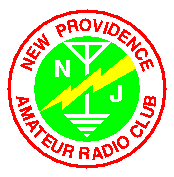|
|
New Providence Amateur Radio Club *** 2/23/26 Meeting ZOOM Only *** |
Club Simplex Frequency:
|
Menu:
ARRL Web Sites:Solar Conditions:
page last modified: Thu Oct 7 06:31:19 2021 PT |
If you would like to learn more about what amateur radio operators (hams) do, please feel free to come to any of our meetings to talk with our members. Also, look over the rest of this web site and feel free to email or telephone one of our club officers with your questions. Please also look at this 4 minute video that gives a quick overview of amateur radio. (If it doesn't work, try these addresses: http://p1k.arrl.org/files/Hello-Movie.wmv or http://p1k.arrl.org/files/HELLO-LONG-PROGRAM.mpg ) Here's another good article about How Ham Radio Works To officially become a ham, you must obtain an entry-level Technician amateur radio operator's license from the United States F.C.C. (Federal Communications Commission). To get the Technician license, you must pass a 35 question multiple choice test that deals with basic electronics, good operating practices, and safety. (Morse code proficiency is no longer required any Amateur Radio licenses.) 1. Studying for the Technician TestTo pass the exam, you must correctly answer at least 70% of the 35 multiple choice exam questions (out of a pool of 510 questions). The 'best' learning method will be different for each person. We recommend that you look over the various options and study aids below. Many members have used a "self-study" program successfully. A general recommendation for a self-study approach is to obtain one or more of the books below, plus find an "Elmer" (an experienced ham) who can help you with your studies by answering any specific questions you may have or by explaining difficult concepts. If you email us or come to a club meeting, we will find a willing a club member to act as an Elmer. Here are some recommended study aids:
2. Taking your Technician Test You can find a date, time and location where licensing exams will be given by using this web site: http://www.arrl.org/arrlvec/examsearch.phtml In some cases, you can simply show up to take the exam, but many test sites prefer that you pre-register. The fee for the exam is $15 (for 2009). When you pay, you will also fill out a FCC application for an amateur radio license. The paper and pencil multiple choice exam will be given by experienced hams, called Volunteer Examiners, who have been authorized to administer the exam and grade it. If you pass the exam, the Volunteer Examiners will submit your application and certificate of successful test completion to the FCC. Within a few weeks, the FCC will mail you an official paper license with your new "callsign". Note that you can check the FCC web site a few days after the exam to see if the FCC has issued you a callsign (search on your last name). You may start using your new radio privileges as soon as you know your callsign; you do not need to wait for the paper license to arrive in the mail. If you fail the exam, you may retake it at any time, but you must pay the exam fee again. 3. Upgrading Your License Looking ahead, there are two higher levels of licenses, the intermediate level General license and the top level Extra license. The higher licenses will allow you to transmit on additional radio frequencies, including those on the "HF" bands which let you communicate over great distances. With a Technician license, you can only use the "VHF/UHF" bands which carry much shorter distances, 20-100 miles typically. The process for upgrading is very similar for these higher licenses -- you must study for and pass a multiple choice exam that tests your technical knowledge. Many of the sites referenced above have learning aids for both the General and Extra licensing exams.
For more information about becoming a ham see this ARRL web site: http://www.arrl.org/hamradio.html
|

